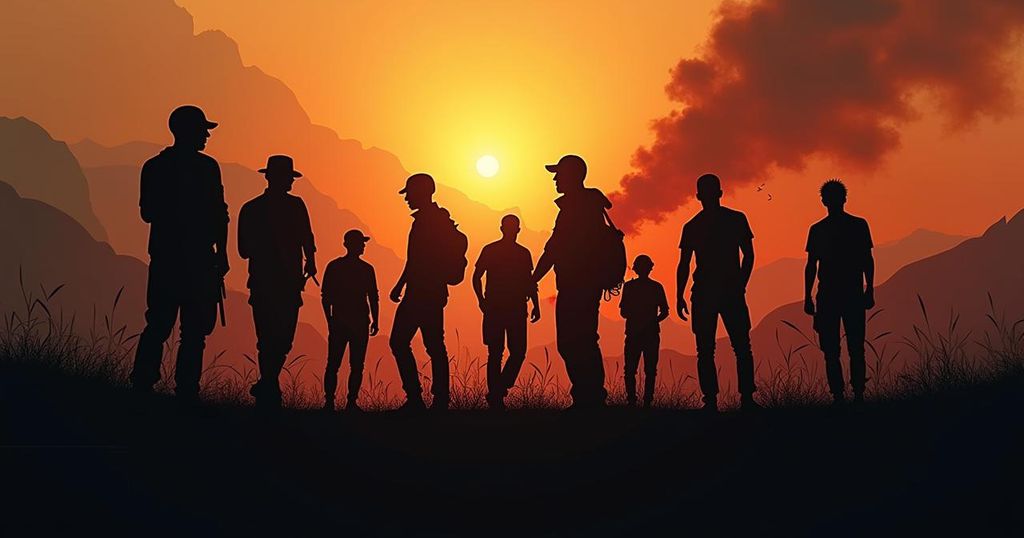Election Protests and Repression in Venezuela: A Cry for Justice and Democracy
In Venezuela, families gather outside a detention center in Caracas seeking news of relatives arrested amidst protests against Nicolás Maduro’s controversial election victory. The initial protests marked a significant shift as people from impoverished neighborhoods joined in dissent, reflecting wider societal unrest. The government’s violent crackdown led to numerous deaths and arrests, branding protesters as terrorists, and deepening the divide within Venezuelan society amid a spiraling humanitarian crisis.
The oppressive heat of the Caribbean sun bore down mercilessly upon the streets of Caracas, where numerous families gathered in front of the Zone Seven Detention Center in Boleíta. They sought information about their relatives detained in the wake of unrest following the contentious announcement of Nicolas Maduro’s election victory—a result that not only solidified his authoritarian reign but was also widely denounced by the opposition and various international entities as fraudulent. Hernán García, a 40-year-old local resident, was amongst those in the queue, desperately searching for news of his 19-year-old son, Luis, who vanished after joining protests against the election results. The developments surrounding Luis reflect a deeper societal fissure, as for the first time in 25 years under Chavismo, citizens from impoverished neighborhoods began to voice their dissent. Chavismo, initially applauded for reducing poverty through redistributive social programs, has seen its fortunes dwindle following the dramatic fall in oil prices post-Hugo Chávez’s death. During Chávez’s rule, the Venezuelan economy thrived on high oil prices, facilitating unprecedented wealth redistribution. However, Maduro, the self-proclaimed successor, now leads a country on the verge of catastrophe with mass emigration surpassing 25% of the population, indicative of a severe humanitarian crisis, exacerbated by widespread hunger and repression. As Maduro faced a sea of protests, many citizens poured into the streets, challenging past narratives and government narratives, which have long attributed national woes to external entities such as the U.S. Following the contentious election results, Caracas experienced devastating riots and clashes with authorities, culminating in a heavy-handed response from the state, targeting predominantly vulnerable populations. Reports indicated that more than 15 individuals had met violent ends in just two days, while thousands faced arrest—deemed terrorists by Maduro himself, with dire prospects of lengthy imprisonments and forced labor awaiting them. With the government actively silencing dissent, protests began to dwindle, yielding to an atmosphere of fear and repression. Maria Corina Machado, a leading figure in the opposition movement, recently mobilized protests exclusively among middle-class, predominantly white reflectors—indicating a stark divide in the demographic representation of dissenters in Venezuela, where the socio-economic dynamic remains fraught with tension and disparity. This division further underscores the prevailing chasm within Venezuelan society amidst an escalating crisis, with stark ramifications for its collective future.
The backdrop of the current upheaval in Venezuela reveals a country grappling with the dual burdens of political repression and economic collapse. Nicolás Maduro’s regime, following in the footsteps of Hugo Chávez, initially enjoyed significant support due to expansive social programs funded by high oil revenues. However, in recent years, the deterioration of the economy, stimulated by plunging oil prices and rampant corruption, has precipitated a drastic decline in living conditions, leading to widespread poverty and malnutrition which has forced millions to flee the country. As unrest grew following usurped election results, the government responded with an iron fist, exacerbating fear among the populace and muddling the once strong allegiance to Chavismo, extending the gap between the government and its erstwhile support base.
In summary, the recent turmoil following the disputed electoral victory of Nicolás Maduro reveals profound societal strife within Venezuela. The mass mobilization against an increasingly authoritarian regime signifies a turning tide, particularly among previously staunch supporters from impoverished communities. The government’s brutal crackdown, framed under accusations of terrorism, presents a dire picture of repression aimed at quelling dissent. As Venezuela faces unprecedented humanitarian crises and societal divides deepen, the quest for justice and democracy becomes even more precarious amid escalating violence, even as international support calls for significant reform and engagement continue to grow.
Original Source: www.thestkittsnevisobserver.com




Post Comment